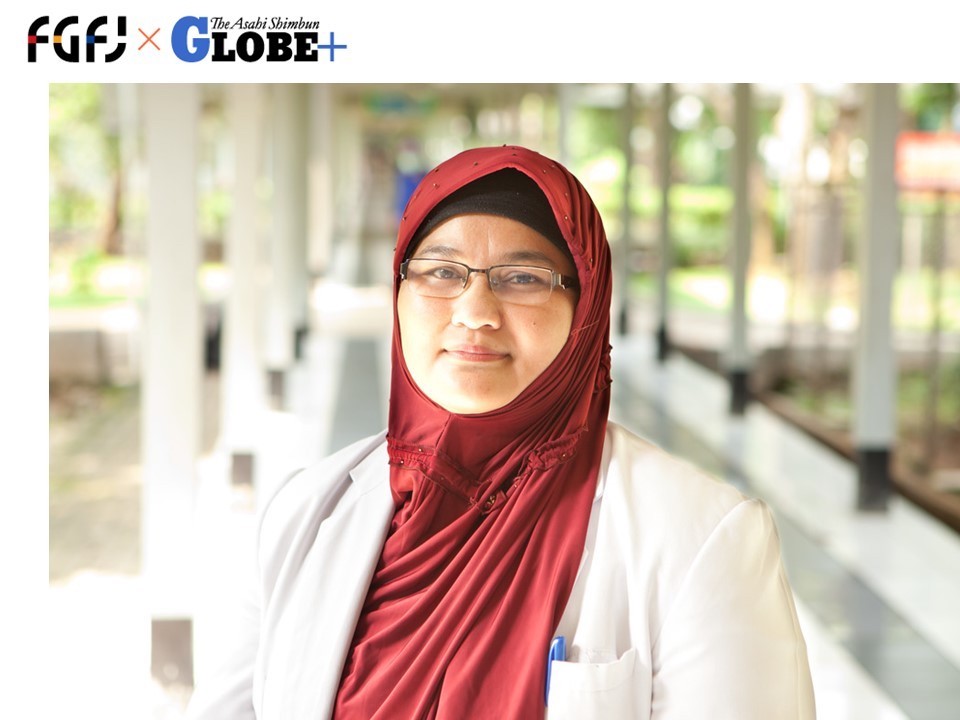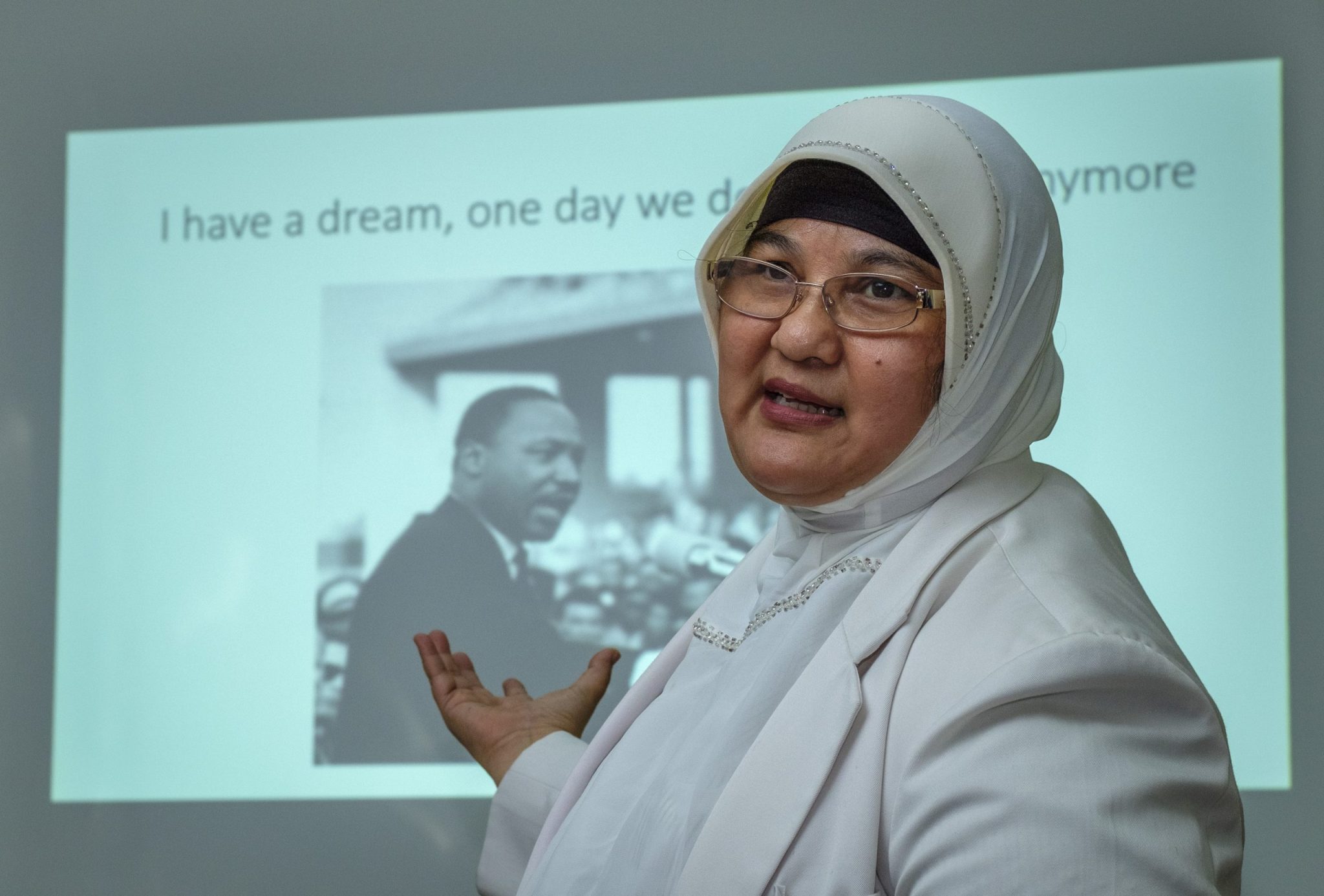 Dr Erlina Burhan, head pulmonologist at the Persahabatan Hospital. ©The Global Fund
Dr Erlina Burhan, head pulmonologist at the Persahabatan Hospital. ©The Global Fund
The latest installment of the “Infectious Diseases Without Borders–Our Story” interview series features Dr. Erlina Burhan, who has been at the forefront of the fight against tuberculosis (TB) for more than 30 years in Indonesia, which has the second highest TB prevalence in the world.
At the time of this interview, the hospital where Dr. Burhan works was designated as a specialized COVID-19 hospital in response to an explosive surge in COVID-19 infections in Indonesia. Although the peak surge of the diseases has finally passed, Dr. Burhan still continues to work to confront both COVID-19 and TB on a daily basis.
“Infectious Diseases Without Borders–Our Story” was formed in collaboration between the Friends of the Global Fund, Japan (FGFJ) and Asahi GLOBE+. To read this interview in Japanese, please visit the Asahi GLOBE+ website.
Q: What is the situation like in Indonesia with the global COVID-19 crisis? Are you also treating COVID-19 patients?
In Indonesia, today (July 27, 2021) we had 40,000 cases with more than 2,000 deaths. The number of cases continues to climb, but we do not know when it hits the top, because it keeps increasing. Indonesia is under emergency restrictions at the highest level. For Jakarta, only essential workers are allowed to work in an office. The majority of people work from home and we call this “WFH.” For us, it also stands for “Work from Hospital.”
In the beginning, we worked with non-COVID patients, but when the infection rose so sharply, the government appointed our hospital as a specialized COVID-19 hospital. Now, to avoid transmission of COVID, the occupants of the 16 inpatient beds reserved for those with multidrug-resistant TB (MDR-TB) were transferred to other hospitals. The 28 inpatient beds reserved for general TB patients are also no longer being used as such as all of our ward is now used for patients with COVID.
Almost all the doctors, not only the pulmonologists, are doing activities to combat COVID. In the beginning, I went to the isolation rooms, but my junior says, “Erlina, you’re our teacher. We need you, so just do consultations.” The junior ones, who are very young, see a patient, make a report, and I give advice to decide the treatment.
In 2020, I was appointed as head of the treatment team of the hospital, and now my position title has changed to the head of COVID management. I still engage with patients as an on-call doctor, but I am mostly occupied with meetings and discussions regarding COVID cases, also with the Ministry of Health on the development of guidelines and treatment of COVID-19. That makes me very tired and stressed, because there is no time to rest. I’m still answering my phone and replying to my WhatsApp even until 1:00 a.m., because people keep coming and I have to give my advice.
I think there is enough supply of personal protective equipment (PPE) like masks and gloves, but for oxygen, there was a time that we ran out due to the overload of patients. We have beds, but we sometimes have to turn away patients who come, especially those who need oxygen. That is very frustrating. If we cannot provide them with oxygen, then we have to refuse them. Patients who we must turn down would then go to one of the other 100 hospitals around the country that have been appointed by the government to also take COVID patients.
 TB patients are being received at RSUP Persahabatan (Persahabatan Central General Hospital). ©The Global Fund / Jiro Ose 2018
TB patients are being received at RSUP Persahabatan (Persahabatan Central General Hospital). ©The Global Fund / Jiro Ose 2018
Q: Why did you decide to become a doctor and specialize in TB?
I have always wanted to be a doctor ever since I was little. In my childhood, at that time, a majority of kids wanted to be doctors or pilots. But I was the one in the group whose goal still hadn’t changed by the time I got to high school, which was when I needed to choose, and yes, I chose to apply for med school and got accepted.
For my master’s degree in Germany, I chose to do research in Namibia to treat TB patients. I realized then that the magnitude of TB burden was really high, and it still is now. That was the first moment that I decided to become a doctor that worked with TB patients. So, when I got back to Germany, I decided to specialize in pulmonology.
Q: What do you find difficult in fighting TB? Is it the lack of vaccines or that many people do not follow treatment, even if they are diagnosed with TB?
It’s the lack of education. People do not know that they need to be treated for six months. So, when they feel better after two months, they decide to stop continuing treatment because they think that they are cured.
Secondly, six months is a long time, so we need to have a much shorter time for treatment. I heard that perhaps, in the near future, the World Health Organization (WHO) will change the duration from six to four months, but I think it’s still too long. To find a new regimen and drop that considerably, let’s say for two weeks, or two months, I think that’s something not impossible with today’s technology.
I think not having an effective vaccine is also one reason why TB has not been controlled until now. The BCG vaccine for TB is from a hundred years ago and is not as effective as we expect. So, with this advanced technology, why can’t all the scientists find something more effective?
There’s also the social aspect. In Indonesia, TB is still stigmatized by the community, so people tend to hide their disease here. Also, there is not sufficient support for patients to finish treatment, especially in the countries in Asia. I’m seeing my patients lose their jobs and unable to earn money because they have TB. If there’s a society that can support their lives, then maybe they would easily be cured, and we could decrease transmission rates.
Other than vaccines, preventive treatment of latent TB (when a person is infected with TB bacillus but has not yet developed TB disease) is also not widely known to many of those who need it. There are a lot of misconceptions. Some people think, “Why do we treat diseases that are not doing anything? Just wait until it’s active, then treat it.” So we have a lot of homework, especially in education, to motivate people, patients, families, and communities, as well.
 Medical personnel works on samples at RSUP Persahabatan (Persahabatan Central General Hospital). ©The Global Fund / Jiro Ose 2018
Medical personnel works on samples at RSUP Persahabatan (Persahabatan Central General Hospital). ©The Global Fund / Jiro Ose 2018
Q: Have you noticed any changes since The Global Fund to Fight AIDS, Tuberculosis and Malaria (the Global Fund) has come in to help fight TB in Indonesia?
With the grant from the Global Fund, advanced labs were installed in our hospital to detect and analyze TB. GeneXpert machines, which have been used for diagnosing TB and that are now useful for COVID diagnostics, have also been purchased. Regarding MDR-TB, I think the Global Fund plays a very important role in trying to offer the countries a program that provides second-line drugs and incorporates training people. I am very grateful for the Global Fund’s contribution.
However, I think there is a challenge because Indonesia still ranks second after India as a high TB-burden country. This is something that is regretful. I think people should talk and discuss again what went wrong and what should be done. The funding should address the system to make it sustainable so that even if there is no money, it still could go on and get the job done. Tasks are given to government employees who already are overloaded with things to do. I do hope that this funding will also be used to hire more people to support the health system.
Q: COVID-19 has changed everybody’s lives, but do you find that people are getting better educated about infectious diseases?
I think COVID-19 really hit us hard, in many aspects. In health, of course, it’s very obvious. In social life too, with no hugging others or going out. In education, because now schools are closed, students are at home on a virtual teaching system. Also, the economy is going down due to the COVID situation. But there are positive things that we can take from the COVID situation. People are aware of health and health education.
So maybe from now, we can talk about TB, that it’s also an infectious disease that is transmitted from airborne droplets and is curable and preventable. People are also now paying more attention to prevention measures and are getting used to wearing masks. They have a better understanding of the need for vaccines. With COVID, in only one year, scientists created vaccines. I think this can open the opportunity to have a TB vaccine in a very short time. That is not something impossible.
Since the pandemic was first introduced, the activity of the three T’s—Tracing, Testing, and Treatment—has become well known. I think this is really applicable to TB. Tracing is when you’re trying to find the one infected, which is really the start of activities. I do think this COVID situation can improve the TB magnitude in the future.
 TB patient arrive at RSUP Persahabatan (Persahabatan Central General Hospital). ©The Global Fund / Jiro Ose 2018
TB patient arrive at RSUP Persahabatan (Persahabatan Central General Hospital). ©The Global Fund / Jiro Ose 2018
Q: Do you have a message to the Japanese audience?
I think countries in the same region, like Indonesia and Japan, have an emotional relationship since a long time ago. So as one region, I think we have to support each other in coordinating and trying to fight infectious diseases. It is impossible for one country to do everything. I think we have to support each other in coordinating and trying to fight communicable diseases to help improve the quality of life for people.
Interviewer’s Note:
I first became acquainted with Dr. Burhan when she was speaking about the plight of TB at a UN meeting. I did not know until then how harsh and long the treatment was for multidrug-resistant TB patients and the hardships of the medical personnel attending to them. I was deeply moved by the question she posed to the audience, “Why is it taking so long to develop a new vaccine to prevent TB?”
As a pulmonologist specializing in TB, Dr. Burhan has saved many lives and has actively spoken at various international conferences; her three daughters who grew up watching her all went to medical school, and one currently works as a doctor. Her son is still in high school and has to study at home due to the COVID pandemic, and so as a mother, she worries about her son while helping COVID patients at her hospital. Another source of concern is that while the vaccination of teenagers has been progressing in Indonesia, allowing her son to be vaccinated, her husband who works as a civil servant is still waiting for his turn to get the vaccine. In addition to being a doctor at the frontlines of the fight against COVID in the harsh medical field, I was also impressed by Dr. Burhan’s warm personality truly caring about her family and the people around her.
– Sachiko Aoki, Japan Center for International Exchange (JCIE) / Friends of the Global Fund, Japan (FGFJ)

About Erlina Burhan
Dr. Erlina Burhan is currently working as a pulmonologist at Persahabatan Hospital Jakarta in Indonesia, where she has been the head of Tuberculosis Directly Observed Treatment (TB-DOTS) and MDR-TB programs since 2006. She also acts as a faculty member of the Facility Medicine at the University of Indonesia, and as the head of its Pulmonary Infection Division in the Department of Pulmonology and Respiratory Medicine.
Dr. Burhan has worked to treat and advocate for TB patients over her 30-year career, and remains an active voice in several professional organizations and expert groups including the International Union Against Tuberculosis and Lung Disease, the American Thoracic Society, the Indonesian Respiratory Society. She obtained a medical degree from Andalas University and a Master of Science degree from Heidelberg University before receiving a pulmonary specialist degree and a PhD from the University of Indonesia.
To read more interviews like this one, please visit the main “Infectious Diseases Without Borders—Our Story” series page.
For interview content in Japanese, please visit the Asahi Shimbun GLOBE+ website.


